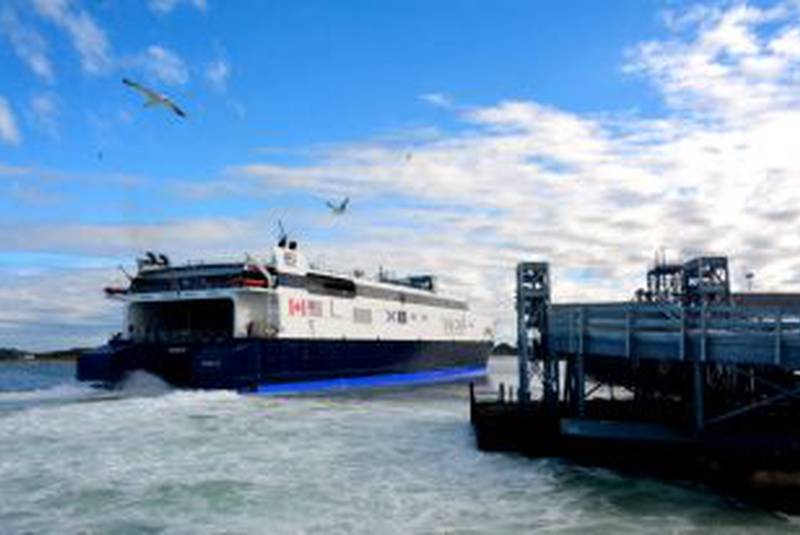![['Cat ferry in port in Yarmouth.']](https://www.trurodaily.com/media/photologue/photos/cache/cat-ferry-3116770_large.png)
There are rough waters for the ferry service between Yarmouth, N.S. and Portland, Maine, with the issue of customs services on the U.S. side threatening the future of the service as early as next season.
The discussion on the need for upgraded facilities at the Ocean Gateway terminal in Portland have been ongoing since 2014. U.S. Customs and Border Protection (CBP) has said it will suspend customs ferry service beyond this season if the upgrades – pegged at $6 to $7 million – are not made by the City of Portland.
Bay Ferries hopes it doesn’t come to this.
“We are aware of ongoing discussions between the City of Portland and CBP around the Portland facility. We have been working with both parties to attempt to identify appropriate solutions to this issue,” Bay Ferries president and CEO Mark MacDonald said Nov. 21.
“As a company we face serious regulatory issues, like this one, on a fairly regular basis. We take these issues very seriously, as we do this one,” he said. “Usually we are able to work with the parties and identify mutually acceptable solutions. We do not speculate on if, how or when such issues might be resolved.”
STATEMENT FROM U.S. CUSTOMS AND BORDER PROTECTION
U.S. Customs and Border Protection said it shared its facility standards with the City of Portland in 2014. In an effort to support local economic growth, it says it agreed to a temporary facility in 2014 and 2015 at the Portland terminal but that this was never meant to be a permanent solution.
“While we cannot share the specific requirements or the costs due to security reasons, at a general level, some of the key upgrades needed at this facility include an additional exit to the primary officer booth, and multiple pieces of technology such as those that read license plates and assist in scanning vehicles for radiation. In addition to safety and security, these required upgrades will also help facilitate a faster and smoother entry for travelers,” said Sean Smith, Public Affairs/Border Community Liaison at the Boston Field Office of U.S. Customs and Border Protection on Tuesday.
“Currently, as there are no plans to provide CBP with a fully compliant facility, we are unable to continue to provide service beyond the 2017 ferry season at this location as we must maintain the highest level of national security at all of our ports of entry,” he said.
Because the terminal facility in Portland is not federally owned or funded, he said the owner, in this case the city, is responsible for providing CBP with a compliant facility.

SEEKING AND WEIGHING OPTIONS
The City of Portland says it doesn’t want to see ferry service go, but the upgrades are costly and not something it is budgeting for.
City spokesperson Jessica Grondin says $6-$7 million is a large investment that the city is not willing to place solely on its taxpayers, particularly given other priorities and uses it has at this section of its waterfront.
“We’ve been working to address (Custom’s) concerns and find a solution that works for all sides because we do not want to lose the connection to Yarmouth and the history that is there,” Grondin says. “But at the same time, is the land that we’re using for the queuing lanes the best and highest use for that piece of property given it is only used two hours of each day when ferry service is in operation?”
She said the city has been upfront with Bay Ferries, and before that with Nova Star Cruises.
“We’ve said for a long time that we could not shoulder this expense on our own,” she said, adding they had hoped federal funding would be an option but that hasn’t materialized.
“We will continue working with Customs to see if we can come up with some interim solutions to continue service for another year.”

PRE-CLEARANCE OPTION?
Another option that has been discussed is customs pre-clearance in Canada at the Yarmouth terminal. MacDonald said Tuesday this is still being investigated.
“This would be the solution to all USCBP issues as effectively no facilities would be required in U.S.” he said. “It is still too early to say what path this could take, but it is being actively considered.”
In a July 2017 letter to U.S. Customs and Border Protection, Portland City Manager Jon Jennings said the city remains committed to working with officials there to support continued ferry service.
“However, there needs to be some point of compromise related to Ocean Gateway customs border protection improvements to support the continuance of ferry service,” he wrote, noting the required quoted upgrades are “beyond the City of Portland’s financial ability.”
He also noted that from 2014 to date the city had invested over $2.8 million in the Ocean Gateway terminal facility.
Bay Ferries ended its 2017 season in mid-October, having carried 41,462 passengers. While this was a 17 per cent increase over the previous year, the passenger tally isn’t where the company had hoped to land. Engine issues starting in late June led to some cancelled crossings and forced a modified sailing schedule, resulting in 84 round trips for the season instead of the originally scheduled 112 round trips. The Nova Scotia government had committed $9.4 million towards the service this past season.
PORTLAND AND BAR HARBOR PORTS
At the end of the season Bay Ferries said it was in discussion with the City of Portland concerning ongoing leasing and other arrangements for the terminal there, but it also said it was looking at the situation in Bar Harbor – a port it sailed to between 1997 and 2009. With the town of Bar Harbor looking to potential purchase the terminal facility, Bay Ferries feels the town should keep open the possibility of future ferry service.
Bar Harbor town council has to make a decision by Nov. 30 on whether to exercise an option to purchase the terminal property from the Maine Department of Transportation (MDOT).
“The price to be paid – $2.5 million if the town has a marine transportation use within five years or $3.5 million with no strings attached from MDOT,” said town manager Cornell Knight on Nov. 21. “The price would be included in the town’s budgeting process over the next seven months with a vote by the town in June 2018.”
Knight said a ferry terminal committee is making a recommendation to the town council that the parcel be used for a multi-use marine facility and the possibility of tendering for cruise ships, and also to support a ferry use, so long as it doesn’t prevent the multi-use option.
For its part, Bay Ferries says the question has arisen as to whether the customs issue in Portland has influenced it to consider Bar Harbor again as a potential port in the future. MacDonald said when it comes to what port or ports to sail to, “that consideration is driven by the wish to identify the best sustainable and lowest cost option for the ferry service.”
Both facilities must meet the standards required by USCBP, he said.
source:-trurodaily




